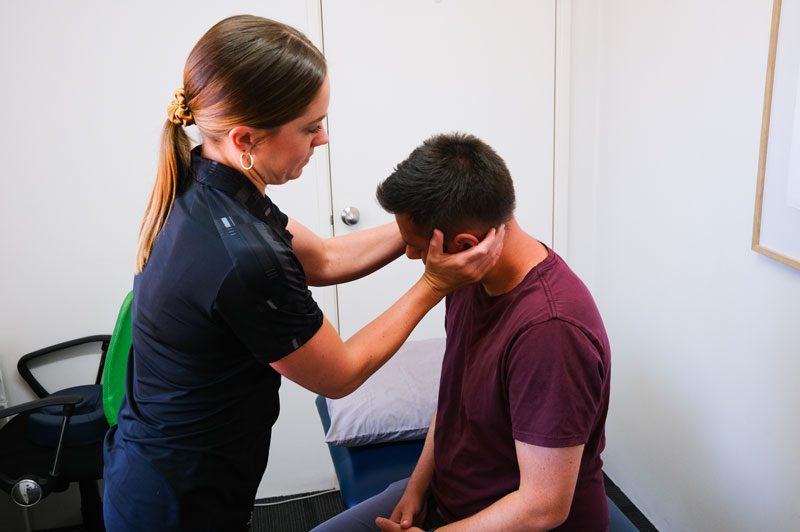What Defines a Headache?
There is a huge spectrum of symptoms that may contribute to a headache. Pain can present all over, or can be localised to one area, such as the back of your head, or behind one eye. Pain can be mild or severe. It can be short-lasting, and persist over days or weeks. Some headaches are aggravated with movement or exercise, while others improve with it. Some headaches cause sensitivity to light and sound. Some present with associated pain in the neck or shoulders. They can be influenced by hormones, stress, fatigue, neck pain, jaw pain, or can be set off by certain triggers, such as food groups, alcohol or caffeine. The causes of headaches vary greatly, with some being of little concern, while more serious causes may mean cause for immediate action.
Physiotherapists are trained in being able to classify your headache into a category, which then allows us to proceed with treatment, or advise you on what you should be doing for your headache. In many cases, physiotherapy treatment and home management will provide significant relief. We may be able to implement changes to your posture, movement patterns or habits that alleviate some of the triggers. In other cases, physiotherapy may not be indicated, and we will be able to tell you exactly what needs to be done next.
What Symptoms Raise Cause for Concern?
If you have the onset of a headache with any of the following symptoms, we advise you to consult with your GP, or head to ED;
- Dizziness
- Blurred vision
- Difficulty speaking or swallowing
- Fainting
- Nausea
- Numbness
- Severe or rapid onset with no trigger
- Recent trauma or infection
- Any other changes in your general health, such as unexplained
- Weight loss or gain, or a history of serious disease such as cancer.
When and How Can Physiotherapy Help?
Physiotherapy can most commonly help with headaches that fit into the category of cervicogenic. This means that they are occurring secondary to an issue in the neck. Often these headaches will have associated neck, upper back or shoulder pain, loss of range of movement, and/or postures that make the pain worse. They are often one sided but can radiate to both sides.
Physiotherapy can also help with tension headaches. These headaches are most often caused by stress and can create a ‘swim cap’ type pressure pain. The pain is usually more generalised and less specific, and often gets better with exercise or movement. Although there are often other factors at play that need to be addressed, such as stress, fatigue, lack of sleep, or lack of exercise, physiotherapy treatment may provide relief, and physiotherapy advice may help you make the necessary changes to address the causes at play.
Physiotherapy treatment can involve manual therapy of the cervical and thoracic spine, soft tissue therapy of the surrounding muscles, dry needling, and other manual techniques. We also will assess your posture in sitting, standing, laying down, and with certain activities that may reproduce the headache. In many cases, weakness in the deep neck flexors can be a significant contributor, along with tight muscles around the neck, shoulders and chest. The combination of these factors can create a round shouldered posture, and a forward poking chin position. This position is particularly common in office workers, where fatigue occurs throughout the day, and posture deteriorates.
We now know that ‘fixing’ the work environment or office space, or forcing an upright posture is not the solution to these causes. In fact – “Your next posture is your best posture”. This means regularly changing your position, whether it be sitting forward or back in your chair, moving from sitting to standing, taking a 30 second break to walk around, or doing some quick mobility exercises. This means that the same structures do not remain under load for lengthy periods of time, making it less likely for them to become painful and problematic.
We also know that regular exercise and strengthening is extremely effective in managing neck pain and headaches. Building strength in the muscles that support your spine, as well as maintaining range of movement in your upper back and neck, means that they are less likely to be easily aggravated or deteriorate in strength and mobility over time.
Our suggestion? If you’re not sure, come and see us for a consult to find out exactly what treatment pathway is the best one for you. In the meantime, take regular breaks, stay active, exercise regularly, manage your stress, and get plenty of sleep!

